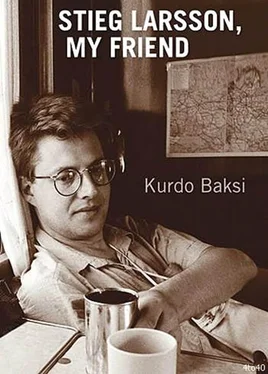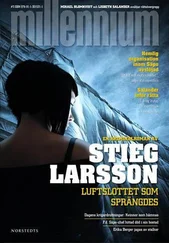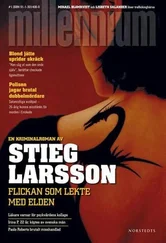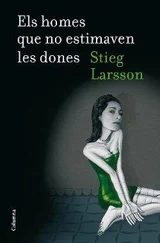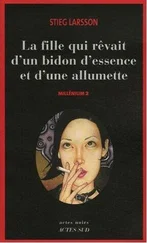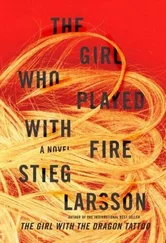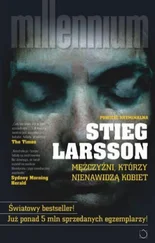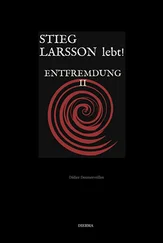When I look back at 2004, I realize that an awful lot happened. On 27 June, Stieg rang sounding breathless. He was very insistent that I should place an article in one of the dailies about the secretary of a political party with neo-Nazi leanings. The man in question had assaulted his partner on several occasions.
I recall him saying “on several occasions” over and over again, stressing the phrase every time. Shortly afterwards he emailed me the text as an attachment. I cut about half of it, then sent it out. The following day it was published in Expressen .
I had only just seen it when Stieg rang me on his mobile.
“Well done. The radio people have just been on the phone,” he said, also mentioning that, as usual, he didn’t expect to be paid for the article.
Nevertheless, I recall feeling rather worried after that phone call. I thought he had started sounding stressed again, under pressure. I wondered if it might be linked to a review of Debatten om hedersmord . A leader writer on Dagens Nyheter had written a piece about it that was dismissive, to say the least. The whole article was malicious in tone, and the reviewer attacked Stieg, questioning his motives. She referred to “oddities in an odd book”. She was very negative about the choice of the nine experts, who, in her view, churned out the same message about the causes and forms of the oppression of women.
As the publisher, I also received my share of her criticism, which while pungent and malicious was not totally unjustified. She reserved her strongest vitriol for Stieg’s co-editor, Cecilia Englund. Cecilia was accused point blank of publishing something that was untrue. She claimed to have been in touch with a specialist on Islam whom she quoted in the book, but when the leader writer checked, that appeared not to have been the case. This created a major crisis of confidence for Stieg, Cecilia and me. Not to mention the publishing house. Stieg went through the roof and wanted me, as the publisher, to write a response to the leader writer. I declined to do so. As a result he immediately wrote a piece that was signed by all nine contributors to the book. It was refused by Dagens Nyheter , which made him even more furious, if that was possible.
In a way it also resulted in Stieg becoming confused. He claimed that there was a dictatorship preventing the free expression of opinions. In fact, the subsequent debate led to him and his supporters being accused of trying to impose just such a dictatorship by citing all kinds of theories as to why the oppression of immigrant women was being suppressed.
The whole debate was a mess. It was also a result of other incidents that had taken place earlier in the year. On 11 March we had all donned our best suits in order to attend the inauguration of the Centre Against Racism. It was in fact Stieg’s appeal to the prime minister five years previously that had led to the foundation of this new institution in Sveavägen, in central Stockholm.
Nevertheless, neither Stieg nor I was welcomed with open arms. We shrugged that off, maintaining that the important thing was that the centre had come into being. But deep down we were both rather offended.
In September the bomb I had been warning about for so long finally exploded. Stieg phoned and said curtly, “Have you seen the article about us employing only men at Expo ?”
“No,” I said with a sigh.
“We’re in the shit.”
Of course we were. There was an article in a weekly magazine under the less than flattering headline “Only white men at Expo ”. And the content was exactly what we had feared: how Expo didn’t employ women or Swedes with an immigrant background.
Stieg had given an interview and made a bold attempt to save the situation. But he wasn’t very successful. Expo had an obvious credibility problem, and he ought to have simply apologized, regretting the situation, and promised to put matters right.
Instead he suggested that it seemed unfortunate that so few immigrants had any interest in questioning nationalist movements. And he added for good measure, “But we have had our nigger-in-chief, Kurdo Baksi, as publisher.”
I thought he must have been under a lot of stress when the interviewer phoned him. It didn’t sound like Stieg at all. Then it occurred to me that what he needed was some peace and quiet. I wanted to tell him that his body was not made of iron. He needed to rest.
He called and apologized for what he had said about me. Then he seemed to find a new source of energy.
“We’ll be getting lots of women and immigrants on Expo , just you wait and see.”
Oddly enough, it was only a couple of days later that we met and he showed me the first interview he had given as a crime novelist. Svensk Bokhandel, the Swedish book trade journal, had carried a long article about the books he was about to publish.
The very headline stopped me in my tracks: “A man for the history books”. It was impossible not to see how thrilled Stieg was. All I felt when I read the text was incredible pride and happiness. There was one sentence which attracted my particular attention. It was a quotation from Stieg: “I can tell you that this is my pension insurance.”
I have often wondered why I keep thinking back to that evening at Södra Teatern. Perhaps it was the look on Stieg’s face. It’s so easy to read things into a situation with hindsight. Or maybe it is to do with my thinking that I’d noticed a slackening off in his strict working practices. That I thought this was somehow liberating. His new way of dressing, perhaps – even if I didn’t think much of it, it did nevertheless suggest a sort of step forward.
But now, afterwards. Now that we know. The comment that his crime novels were a sort of pension insurance. I’ve no doubt he didn’t say that to trivialize his writing. He would never have done that. But I can’t help thinking that he knew what was going to happen, even then. The success lying in store for him.
He never experienced it, as we all know.
In my life the year 2004 stands out as a sort of watershed. I can divide up so many things into what happened before then and what happened afterwards. That year 2004, which as far as Stieg was concerned consisted of just 312 days.
Farewell
November was always the most important month in my relationship with Stieg. It was the time when the matters he and I were most concerned with were at the forefront of most people’s minds in Sweden, so we met more often than usual. If you go through the appeals and articles we wrote, you will find that most of them were written in November.
The first time we ever met with nobody else present was in November. We made a public announcement about the planned cooperation between Svartvitt and Expo in November. And of course, there is also the date that will always be connected with our work: 30 November, the anniversary of the death of the Swedish warrior-king Charles XII in 1718, a day hijacked by the nationalists for their annual celebrations.
November is not a month you can rely on. Some years ago a group of neo-Nazis shot at my flat in November. It is as if everything horrible in my life happens during that month, when the Swedish winter makes the days dark and gloomy. It’s said that Swedes always talk about the weather, and I have to agree that it’s true. But they are dependent on the weather, and the climate is cruel. In October it is just about possible for brief spells of life-giving Indian summer to interrupt the nasty, damp autumn weather and brighten up people’s minds. But November is ruthless, relentless and without compromise. Everybody knows that five months of darkness lie in store.
Читать дальше
